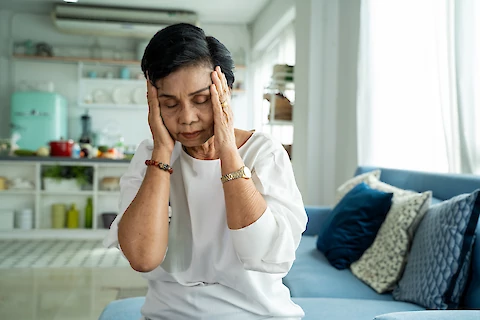
For seniors living with Alzheimer's or dementia and their loved ones, sundowning can present a serious problem. If you have found yourself affected by sundowning, you may feel confused, frustrated, or unsure of what to do next. Fortunately, there are several strategies that can make it easier to navigate the difficulty associated with sundowning.
What Is Sundowning?
Sundowning refers to a phenomenon in which individuals with Alzheimer's or other forms of dementia experience increased agitation, confusion, anxiety, and restlessness during the late afternoon and evening hours. The term "sundowning" is derived from the fact that these symptoms tend to worsen as the sun goes down.
There are several potential causes or triggers for sundowning. Fatigue is a common culprit, as individuals may become more tired as the day progresses. Low lighting can also contribute to increased agitation, as it can cause shadows and make it more challenging to see and navigate the surroundings.
Sundowning can also result from a disruption of the internal body clock, causing individuals to become disoriented and confused about the time of day. Furthermore, environmental factors such as increased noise levels and changes in routine can exacerbate sundowning symptoms.
Self-management and Reducing the Effects of Sundowning
There are several strategies you can introduce to make it easier to reduce the impact of sundowning and help you navigate evenings more successfully.
Establish a Routine
To help manage and reduce the effects of sundowning, it's crucial to establish a consistent daily routine. This includes maintaining a regular sleep schedule and having meals at the same times each day. A predictable routine can help reset the internal body clock, making it easier to navigate the day and reduce the likelihood of agitation.
Create a Calm Environment in the Evening
Creating a calm environment is also essential in managing sundowning. Reducing noise and clutter can help minimize distractions and create a soothing atmosphere. Additionally, soft lighting can help alleviate confusion and agitation caused by low light or shadowy conditions.
Choose Relaxing Activities
Engaging in relaxing activities during the afternoon and evening hours can also help reduce sundowning symptoms. Examples of calming activities include listening to music, reading, or taking a warm bath. These activities can promote relaxation and reduce anxiety.
Include Exercise in Your Schedule
Regular exercise and physical activity can also have a positive impact on sundowning symptoms. Activities such as walking, gardening, or practicing yoga can help reduce agitation and promote a sense of well-being. Make sure you talk to your doctor before introducing any new exercise or physical activity to your schedule.
Limit Caffeine and Sugar
Limiting caffeine and sugar intake, particularly during the afternoon and evening hours, can also help minimize agitation and anxiety. Keeping a journal to track symptoms and identify triggers is another useful tool when it comes to managing sundowning.
Steps to Take with Caregivers
In addition to self-management strategies, it's essential to involve loved ones and caregivers in addressing sundowning symptoms. Start by informing your doctor about your symptoms and triggers. Your doctor may suggest medication options or other treatments to help manage your symptoms.
The following are also worth considering:
Hiring a Caregiver
Hiring a caregiver can provide additional support during the evening hours. A caregiver can offer companionship and assistance with evening routines, helping to create a calm and structured environment during the time of day when sundowning symptoms may be at their peak.
Respite Services
Consider exploring adult day care or respite care services as another option for support. These services can provide structured activities and social interaction during the day, helping to promote a healthier sleep schedule and reduce sundowning symptoms.
Support Groups
Joining a support group for individuals with Alzheimer's and their families can also be beneficial. These groups provide a forum to share experiences, learn from others, and gain valuable insight into managing sundowning and other Alzheimer's-related challenges.
Get Help Managing Sundowning Symptoms at Home
Understanding and managing sundowning symptoms is crucial for seniors with early-stage Alzheimer's and their families. By implementing self-management strategies and seeking support from caregivers and loved ones, you can reduce the impact of sundowning and improve your overall quality of life.
If you live in the Riverside, Hemet, Moreno Valley, or San Jacinto area and are seeking assistance with managing sundowning or other aspects of Alzheimer's care, don't hesitate to reach out to Senior Helpers Riverside. Our compassionate team of professionals can provide care when you need it most, reducing the stress on you and your loved ones and helping you navigate evenings more effectively.